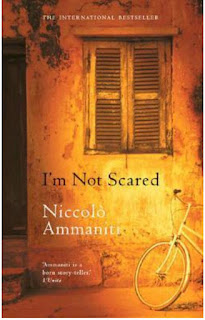I'm Not Scared
I’m not Scared was a great success for Niccolò Ammaniti, published in 2001 when the author was aged thirty-five. The story is narrated by Michele Amitrano, a curious child living in a dull, hot hamlet where nothing much happens. Exactly where and when Michele is when he recalls the events of that summer is unclear, but some time has passed (‘The wheat was high that year …’[p.1]; ‘That morning we went off on our bikes’ [p.5]). The narrative opens with the children riding out beyond the boundaries set by their parents. As a storm approaches, they find an abandoned farmhouse, and Michele is dared to enter (an act of selflessness to save the dignity of a girl in the gang). As Michele finds a hidden underground recess, he thinks he has found a corpse. He doesn’t tell the others and returns home with the first terrible secret.
Ammaniti’s portrait of boyhood is from a bygone era, when fathers wielded an authority stemming from an accepted level of violence. Beyond the household, worldly injustice is similarly an unchangeable fact: the great class divide means that gentler lives are beyond imagination or realistic aspiration. The inhabitants of the village, and particularly the truck-driving father, are sketched precisely and memorably. There is nostalgia, too: the harsh life isn’t really threatening until his father brings home an older man who has every appearance of being a hardened criminal, and with whom Michele is forced to share his bedroom. Michele returns to the farmhouse and discovers that his corpse is alive: it is a frightened child, chained up in the dark. Slowly he understands that his parents and other villagers are implicated in a indefensible and doomed plot.
This is a short novel (200 pages) told simply. Its resonance lies in the author’s ability to portray criminal acts in human terms, illuminating how hardship and wider injustice can feed into desperation and conspiracy. Ammaniti draws the novel to an exciting close—a filmic narrative that indeed, made for a successful Italian cinematic adaptation and further success for the writer.




Comments
Post a Comment